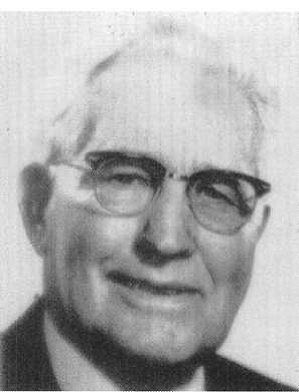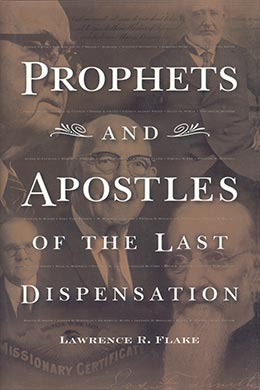Hugh Brown
Lawrence R. Flake, Prophets and Apostles of the Last Dispensation (Provo, UT: Religious Studies Center, Brigham Young University, 2001), 217–21.

Born: 24 October 1883, Granger, Utah
Assistant to the Quorum of the Twelve: 4 October 1953
Quorum of the Twelve Apostles: 10 April 1958 (age 74)
Additional counselor to President David O. McKay: 22 June 1961
Second counselor to President David O. McKay: 12 October 1961
First counselor to President David O. McKay: 4 October 1963
Returned to the Quorum of the Twelve Apostles: 18 January 1970
Died: 2 December 1975 (age 92), Salt Lake City, Utah
A young man of eighteen was riding a sulky plow down the long, black furrows of his father’s fields in Alberta, Canada. He seemed to pay little attention to the direction the team of horses was pulling the plow, for he was buried deep in the pages of an open book. His future greatness as a scholar, soldier, missionary, lawyer, businessman, and general authority was foreshadowed in his desire to improve himself during the long hours behind the plow. His mother, Lydia J. Brown, observed, “The Lord must guide the horses because I can’t otherwise understand how Hugh could plow a straight furrow and still keep his head in a book.” [1] His father, Homer M. Brown, moved his family to Canada from Salt Lake City when Hugh was sixteen years old. Farm work temporarily ended his formal education, but he longed for more, and he prayed that the Lord would open up the way for him to return to school. Before long, he was blessed with the meager means needed to set out for Brigham Young College in Logan, Utah.
Once again, after attending college a short while, Hugh found his educational plans interrupted as he was called to serve a mission in England. He labored under mission president Heber J. Grant. During his mission, the apostle healed him of an infirmity that threatened to end his mission. His first area was the university city of Cambridge, where mobs had recently driven out the missionaries who labored there. For several days he had no companion, and he struggled in vain to find anyone to teach. He wondered what possible good he could do in so unlikely a situation—an uneducated Canadian farm boy in a setting steeped in tradition and scholarship. In this state of great despair, a knock came at his door. It was a man who had found a tract Elder Brown had left. The man explained that his own and sixteen other families had left the Church of England and were seeking a new pastor; he felt the tract was an answer to prayer and wanted Elder Brown to preach to them. Frightened at the prospect of speaking to a group of strangers, the young missionary immediately began fasting and praying. At his first meeting, he asked the congregation to kneel with him as he offered a humble prayer: “As I spoke the name of God, I lost all fear, all worry and all concern and felt sure that He would take over, which He did in a miraculous way.” [2] Within three months, everyone who was present on that occasion had been baptized.
Upon returning from his mission, he found that the girl he had hoped to marry, Zina Card Young, was engaged to someone else. [3] His stake president assigned him to attend April conference and promised him that if he would place the Lord first in his life, Zina would break off the engagement and marry him. [4] The prophecy was fulfilled a year later, in 1908, as the two were married in the Salt Lake Temple. They became the parents of six daughters and two sons, one of whom died in World War II.
In the years that followed his marriage, Elder Brown engaged in an unusually wide variety of pursuits. He performed military service for his country of Canada, rising from lieutenant to major in only three years; he pursued and completed a law degree and entered into private practice in both Canada and Utah; he served as a stake president twice—in Lethbridge, Canada, and Salt Lake City, Utah; he entered politics and, though unsuccessful, sought to run for Utah state senator on the Democratic ticket; he served two terms as a mission president in Great Britain, once before the war and once after. He also was called to be the coordinator for all of the one hundred thousand Latter-day Saint servicemen enlisted at that time. He taught religion classes at Brigham Young University from the end of the war until 1950, at which time he had the opportunity to go into the oil development industry. [5]
Just on the verge of becoming enormously successful financially, he began to feel a deep sense of unrest. He prayed that if the wealth he was about to come into would be bad for him and his family, the Lord would somehow end the prospect of it. His prayer must have been inspired, for soon afterward, on a night in April 1955, Elder Brown could not sleep. Retiring alone to a room, he felt an overwhelming sense of deep despair: “All night I wrestled with the evil spirit. I was possessed with the spirit of wishing that I could be rubbed out of existence. I had no thought of suicide, but wished the Lord would provide a way for me to cease to be. The room was full of darkness and an evil spirit prevailed, so real that I was almost consumed by it.” [6] The very next night President David O. McKay called him on the phone and informed him that he had been chosen by inspiration to become a general authority, one of the Assistants to the Twelve. Three years later, in 1958, he was ordained an apostle, and in 1962 he was called as an additional counselor in the First Presidency. He subsequently became the second counselor and then first counselor as the other two counselors in the First Presidency, J. Reuben Clark and Henry D. Moyle, passed away. When President McKay died, Elder Brown returned to his position in the Quorum of the Twelve until his own death in 1975.
Elder Brown traveled extensively as a general authority and wrote a number of books, including You and Your Marriage, which came as a result of the wise counsel on that subject that he had given to numerous couples who had requested his help over the years. He was an excellent writer and a powerful speaker. Marvin J. Ashton, who was one of his former missionaries and who later became a fellow apostle, observed, “In his speech he was eloquent in plainness. In life he was always proper yet approachable. He was refined but not restrictive; firm but friendly; courageous, yet kind and always lifting with beautiful understanding and with a priceless sense of humor.” [7] When asked the common question “How do you feel, Brother Brown?” he would say, “Like a million,” and then add, “all spent!” [8] He served as a special witness of Christ. He bore powerful testimony of him: “From the same source and with the same authority as Peter, I testify that Jesus of Nazareth is the Son of the living God, our Redeemer.” [9]
Adversity and triumph battled constantly for the soul of Hugh B. Brown. As a child, he suffered with a speech impediment; as a young father, he had a severe attack of tic douloureux, which required him to have the cable nerve to his face severed to avoid the excruciating pain; and later he was afflicted with Parkinson’s Disease. “‘Oh, Lord/ his family often heard him pray, ‘if in order to be humble we must be humiliated, give us the courage to say, let it come.’” [10] He used the example of a currant bush being pruned so that it could produce more and better berries. [11] He was a perfect example of someone who suffered this pruning. He said, “The experiences I treasure most are the ones I would have avoided at the time if I could have.” He also said, “I have learned more from brickbats than from bouquets,” and “Sometimes we all need to be shaken up so that the glory can come out.” [12] And in his case, the glory did come out. He rose above all his hardship to endure as a great and noble leader in the Lord’s kingdom.
When he died in 1975, just one year after losing his beloved wife, he was, at ninety-two years of age, the patriarch among the General Authorities. [13] At his funeral, Elder Marvin J. Ashton said, “Hugh B. Brown was in the noblest sense of the word a servant to his family, to his neighbors, to his missionaries, to his clients, to his community, to his servicemen, to his students, to his brethren and to his God. I have no doubt, my brothers and sisters, that in a celestial role today he continues the quest the same way.” [14]
Notes
[1] Edwin B. Firmage, “Elder Hugh B. Brown, 1883–1975: In Memoriam,” Ensign, January 1976, 88.
[2] Firmage, “In Memoriam,” 88.
[3] Eugene E. Campbell and Richard D. Poll, eds., Hugh B. Brown: His Life and Thought (Salt Lake City: Bookcraft, 1976), 42.
[4] Firmage, “In Memoriam,” 89.
[5] Firmage, “In Memoriam,” 90.
[6] Firmage, “In Memoriam,” 90–91.
[7] “Elder Brown: A Child of Destiny,” Church News, 13 December 1975, 12.
[8] Truman G. Madsen, “Hugh B. Brown—Youthful Veteran,” New Era, April 1976, 17.
[9] Madsen, “Youthful Veteran,” 18.
[10] Madsen, “Youthful Veteran,” 16.
[11] Campbell and Poll, Life and Thought, 1–2.
[12] Madsen, “Youthful Veteran,” 16.
[13] Campbell and Poll, Life and Thought, 317.
[14] “Child of Destiny,” 12.
